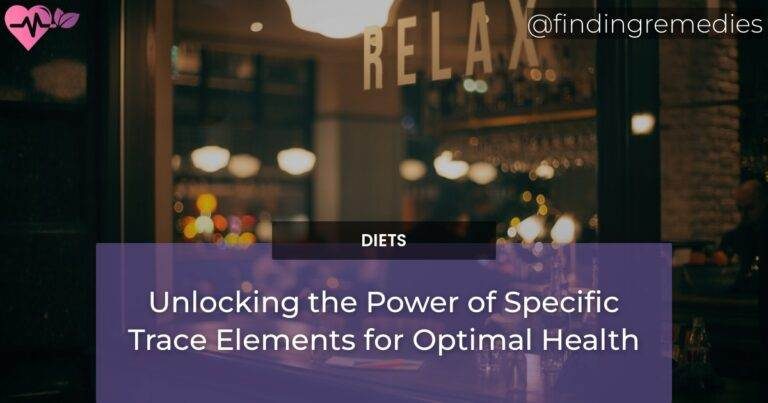Trace elements are essential minerals required in small amounts by the body for a variety of functions. Though they are needed in small quantities, their absence can lead to severe health problems. In this article, we will discuss the benefits and risks associated with consuming specific trace elements, including zinc, iron, copper, selenium, manganese, iodine, chromium, molybdenum, fluoride, boron, vanadium, cobalt, nickel, and silicon.
Table of Contents
Selenium
Selenium is an essential trace element that plays a crucial role in several physiological functions such as DNA synthesis, immunity, and thyroid hormone metabolism. Some foods that are rich in selenium include:
- Brazil nuts
- Tuna
- Beef
- Pork
- Chicken
- Eggs
- Spinach
The benefits of consuming selenium-rich foods include:
- Reduced risk of certain cancers such as lung, prostate, and colorectal cancers
- Improved immune function
- Lower risk of heart disease
The recommended daily intake of selenium is 55mcg for adults. Consuming too much selenium can lead to toxicity, which can cause hair loss, nausea, and in severe cases, nerve damage and paralysis.
Magnesium
Magnesium is a mineral that is involved in over 300 biochemical reactions in the body. Some foods that are rich in magnesium include:
- Almonds
- Spinach
- Cashews
- Black beans
- Avocado
- Salmon
The benefits of consuming magnesium-rich foods include:
- Lower risk of type 2 diabetes
- Reduced risk of heart disease
- Improved bone health
The recommended daily intake of magnesium is 310-420mg for adults. Consuming too much magnesium can lead to diarrhea, nausea, and stomach cramps.
Zinc
Zinc is a mineral that is involved in the production of DNA and protein synthesis. Some foods that are rich in zinc include:
- Oysters
- Beef
- Lamb
- Almonds
- Chickpeas
- Yogurt
The benefits of consuming zinc-rich foods include:
- Improved immune function
- Reduced risk of age-related diseases such as macular degeneration
- Improved wound healing
The recommended daily intake of zinc is 8-11mg for adults. Consuming too much zinc can lead to nausea, vomiting, and diarrhea.
Copper
Copper is a mineral that is involved in several physiological functions such as iron metabolism and the synthesis of connective tissue. Some foods that are rich in copper include:
- Liver
- Shellfish
- Chocolate
- Nuts
- Beans
The benefits of consuming copper-rich foods include:
- Improved immune function
- Reduced risk of osteoporosis
- Improved heart health
The recommended daily intake of copper is 900mcg for adults. Consuming too much copper can lead to gastrointestinal distress, such as nausea and vomiting.
Iodine
Iodine is a mineral that is essential for the production of thyroid hormones. Some foods that are rich in iodine include:
- Seaweed
- Cod
- Dairy products
- Eggs
- Prunes
The benefits of consuming iodine-rich foods include:
- Improved thyroid function
- Lower risk of goiter
- Improved cognitive function
The recommended daily intake of iodine is 150mcg for adults. Consuming too much iodine can lead to hyperthyroidism, which can cause weight loss, tremors, and heart palpitations.
Iron
Iron is a mineral that is involved in oxygen transport and the production of red blood cells. Some foods that are rich in iron include:
- Red meat
- Poultry
- Beans
- Spinach
- Fortified cereals
The benefits of consuming iron-rich foods include:
- Reduced risk of anemia
- Improved cognitive function
- Improved immune function
The recommended daily intake of iron is 8-18mg for adults. Consuming too much iron can lead to iron toxicity, which can cause abdominal pain, vomiting, and in severe cases, organ failure.
Manganese
Manganese is a mineral that is involved in several physiological functions such as bone development and wound healing. Some foods that are rich in manganese include:
- Whole grains
- Nuts
- Leafy green vegetables
- Tea
- Beans
The benefits of consuming manganese-rich foods include:
- Improved bone health
- Lower risk of osteoporosis
- Improved wound healing
The recommended daily intake of manganese is 1.8-2.3mg for adults. Consuming too much manganese can lead to neurological symptoms such as tremors and muscle rigidity.
Phosphorus
Phosphorus is a mineral that is involved in several physiological functions such as bone and teeth formation. Some foods that are rich in phosphorus include:
- Meat
- Dairy products
- Whole grains
- Nuts
The benefits of consuming phosphorus-rich foods include:
- Improved bone and teeth health
- Improved cell function
- Lower risk of kidney disease
The recommended daily intake of phosphorus is 700mg for adults. Consuming too much phosphorus can lead to mineral imbalances and can cause kidney damage over time.
Potassium
Potassium is a mineral that is involved in several physiological functions such as muscle function and blood pressure regulation. Some foods that are rich in potassium include:
- Bananas
- Sweet potatoes
- Beans
- Avocado
- Spinach
The benefits of consuming potassium-rich foods include:
- Lower blood pressure
- Improved muscle function
- Reduced risk of stroke
The recommended daily intake of potassium is 2,500-3,000mg for adults. Consuming too much potassium can lead to hyperkalemia, which can cause muscle weakness and heart palpitations.
Calcium
Calcium is a mineral that is essential for bone and teeth health. Some foods that are rich in calcium include:
- Dairy products
- Leafy greens
- Sardines
- Tofu
- Almonds
The benefits of consuming calcium-rich foods include:
- Improved bone and teeth health
- Lower risk of osteoporosis
- Lower risk of type 2 diabetes
The recommended daily intake of calcium is 1,000-1,200mg for adults. Consuming too much calcium can lead to kidney stones and hypercalcemia.
It is important to consume a balanced diet that includes a variety of nutrients, including trace elements. The recommended dietary intake of these elements can vary depending on age, sex, and other factors, so it is essential to consult with a healthcare professional before making any significant changes to your diet.

